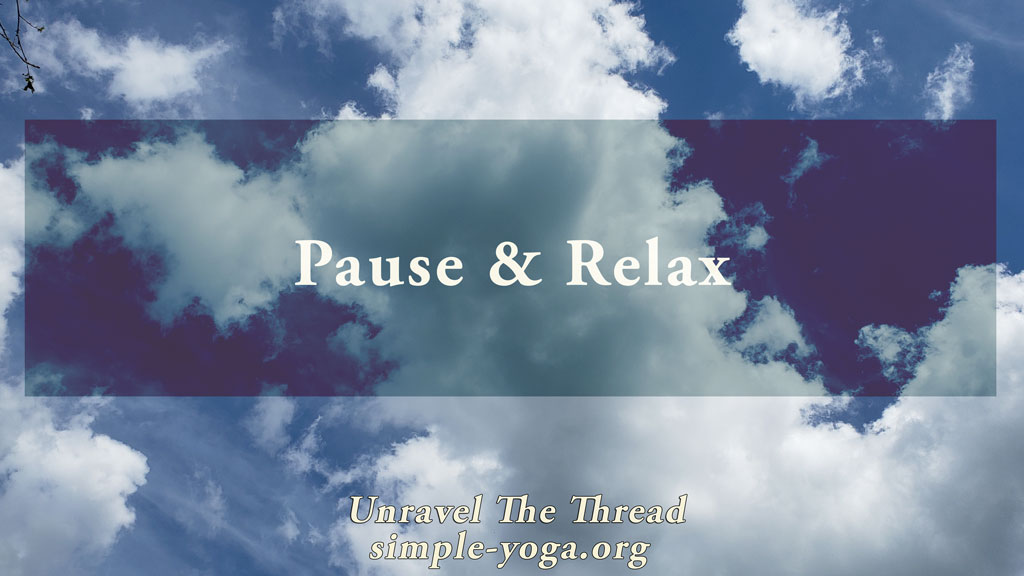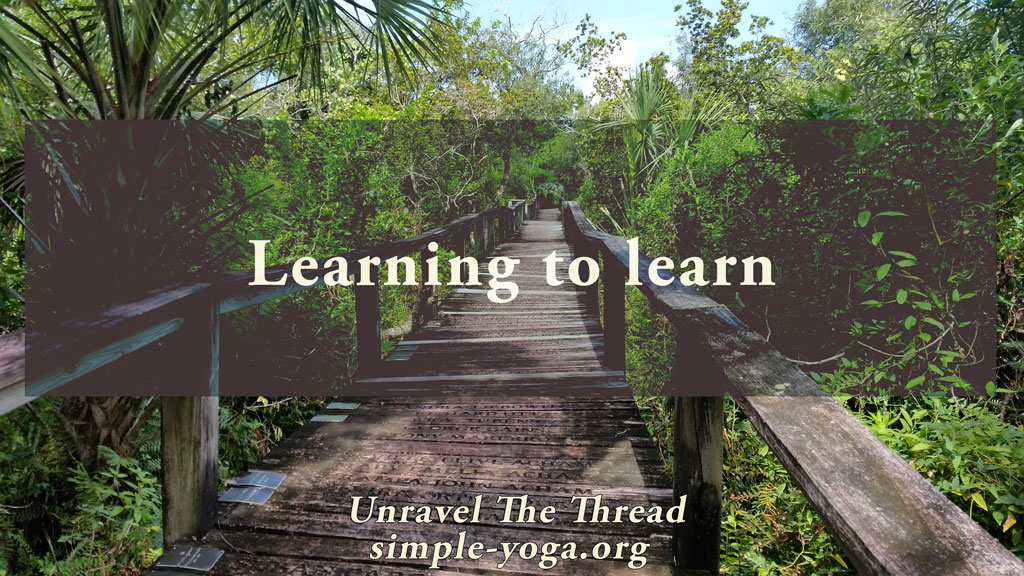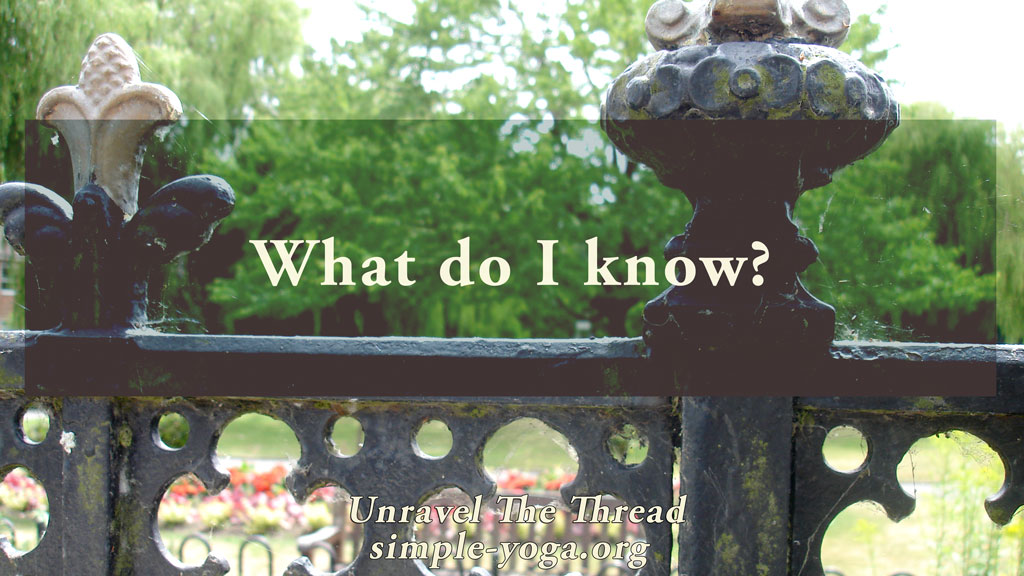
Pause and relax
April 17, 2023
Learning to learn
May 1, 2023
Pause and relax
April 17, 2023
Learning to learn
May 1, 2023What do I know?

What do I know?
Once we decide that it is important to be present in our lives, we can make our actions conscious and deliberate. As a result, we notice how often our intention of making our actions conscious is obscured or derailed by some of the habits that we have been cultivating. It is worth examining the habits that we have been cultivating, knowingly and unknowingly. Patanjali lists five categories of these ways of being (citta vritti) in Yoga Sutra 1.5, including knowledge, misinformation, imagination, memories, and dreams. These ways of being may or may not cause suffering depending on how our ways of being are colored by the five afflictions listed in sutra 2.3. In brief, what we know is influenced by perceiving or misperceiving the true nature of things (avidya 2.4 and 2.5), who we think we are (asmita 2.6), what we desire (raga 2.7), what we avoid (dvesha 2.8), and by clinging to life in the form of attachment to the temporary identity we have become identified with (abhinivesha 2.9).
Let’s start by asking, what do I know? This simple question offers great potential for deep contemplation. In sutra 1.7 Patanjali gives us more detail about knowledge (pramana: right perception), indicating that knowledge can be the result of our direct experience, our inferences, or the testimony of an authoritative source. The fundamental question in this practice is What do I know? We ask ourselves this question and then follow up with, how do I know what I know? We can use Patanjali’s suggestion by further clarifying our question by considering, is what I know the result of my direct experience? Even when what I think I know is the result of my direct experience it will be useful to consider how my knowledge may be colored by one of the five afflictions. Is what I know biased by who I think I am (asmita)? Perhaps, I am so invested in my own beliefs and stories that my views may be biased, but I do not know that they are? Is what I know influenced by what I like (raga)? Or is what I think I know influenced by what I dislike and avoid?
If I have not experienced what I claim to know, is my knowledge the result of judicious inference? How have I arrived at my inference? How can I verify that my reasoning is sound and logical? We can also pass this inquiry through the filter of the afflictions (klesha) to find out if my inference is biased by my sense of identity, by my likes, by my dislikes, and by my desire to keep my identity alive. Another way of thinking about this last question is by paying attention to how our desire to leave a legacy might be interfering with our reasoning and inference.
In the cases when I have not experienced something directly, and I cannot infer if it is true, I could rely on a trustworthy source. Once again, in the process of identifying a reliable source I might be influenced by who I think I am, what I like, what I dislike, and by my sense of self-importance.
Ideally, I could triangulate all three sources of knowledge by comparing my direct experience, with my reasoning and with the testimony of a dependable authority. If all three agree, then what I know is true knowledge.
Let’s pause for a moment and reconsider, why would I want to establish what I know? Is it possible that what I think I know is deeply influenced by my upbringing? For instance, consider how your early experiences growing up have contributed to creating what you consider your needs, what you want and how you react when you get or don’t get what you want. Notice also that the guidance you received during this process, or lack thereof, has probably influenced some basic concepts such as what you consider normal, natural, correct, incorrect, and desirable.
Could it be possible that your experiences with the people and environment that surrounded you during your upbringing may influence your perspective on what you consider smart, capable, beautiful, useful, important, relevant, irrelevant, and necessary? Do those early experiences color what you think, what you think you can do, and what you think you can’t do?
The culture and social institutions around us also tend to have a strong influence on what we think we know and what we think is worth knowing. All of these ideas about what knowledge is and what is worth knowing can, in themselves, become obstacles to our clear and effective actions. Then, it can be useful to take a further step and evaluate what I think I know against common sense. Is what I know common sense? Does what I know go against common sense? Using common sense as a parameter to measure what you know can be a way to ensure that your knowledge can be put into action. From this perspective we can think that our actions and their effects confirm if what we know is true knowledge.
You may remember that the general word that Patanjali used for correct knowledge is pramana, that also translates to right perception, right measure, oneness, and unity. Is it possible that what you know, when true, brings you into a sense of unity and oneness?
Consider taking some of the questions we explored today into your morning reflections, even if only for a couple of minutes. Perhaps with the intention to use the questions as a guide to examining what you know and what you think you know as you go through your daily activities.
If you prefer, you may listen to the podcast:
This is an excerpt from the book Unravel the thread: Applying the ancient wisdom of yoga to live a happy life
If you find Simple-Yoga.org and Unravel the thread useful, consider supporting my labor with a donation, you may also donate using PayPal or Venmo. Thank you!
